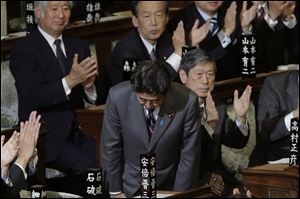
Concern in Japan
Shinzo Abe is not your father’s, or his father’s, Japanese leader.
7/24/2013
Abe
Shinzo Abe is not your father’s, or his father’s, Japanese leader. The country’s prime minister has broken the mold, in substance and style.
Mr. Abe, whose father and grandfather were major political figures in Japan, was prime minister once before, for about a year. That’s short even by Japanese standards. His term was a disaster and his health collapsed.
His political comeback is dramatic. And his new style is unlike his own former persona; he is more direct and more American. Mr. Abe lived in the United States for a time.
Having won a decisive majority in the government’s upper house this week, he has overcome what the Japanese call a “twisted parliament,” or divided government. He is said to be assured of a lengthy (by Japanese standards) three years, give or take, to make his “Abenomics” work.
What is Abenomics? Some say it is simply supply-side economics. But it is an eclectic mix: Mr. Abe favors cuts in corporate taxes, deregulation, free trade (which has been a hard sell in Japan), and restarting nuclear power plants.
He also favors funding public works programs to create jobs. His free-trade stance would be good for the United States, including Ohio and Toledo.
Of greater concern is that Mr. Abe wants to build up Japan’s military and rewrite the nation’s postwar constitution. That has Japan scholars worried. He is aggressive toward China and toward territories that are in dispute between China and Japan. His stance is troubling.
Most alarming is that Mr. Abe is a World War II revisionist. Japan never tortured prisoners, Mr. Abe asserts; all Japanese soldiers were heroes.
The prime minister is a pragmatist, a populist, and a nationalist. Right now, he is extraordinarily popular in his country. He is a man to watch, with both interest and wariness.